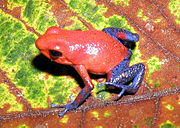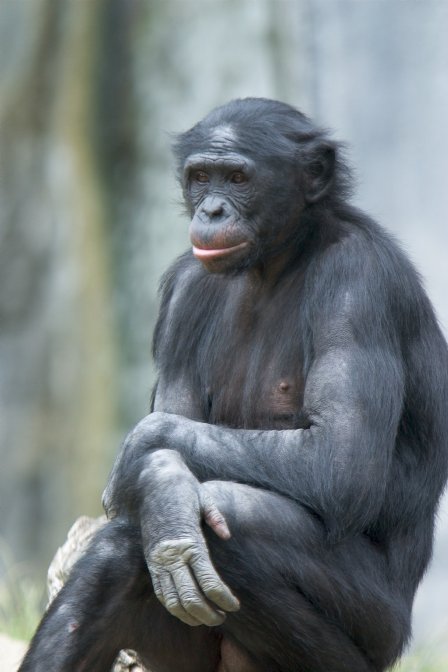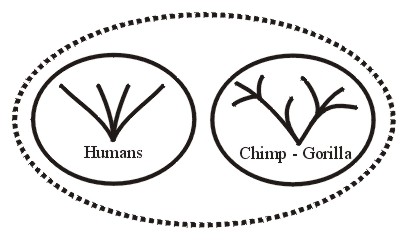Observable, Repeatable Experiment in Evolution
|
|
by
RebelSnake
LionPublished on Wed Jun 04, 2008 12:34 pm |
3
http://scienceblogs.com/loom/2008/06/02/a_new_step_in_evolution.phpA New Step In Evolution
Category: Microcosm: The Book
Posted on: June 2, 2008 9:41 PM, by Carl Zimmer
One of the most important experiments in evolution is going on right now in a laboratory in Michigan State University. A dozen flasks full of E. coli are sloshing around on a gently rocking table. The bacteria in those flasks has been evolving since 1988--for over 44,000 generations. And because they've been so carefully observed all that time, they've revealed some important lessons about how evolution works.
The experiment was launched by MSU biologist Richard Lenski. I wrote about Lenski's work last year in the New York Times, and in more detail my new book Microcosm. Lenski started off with a single microbe. It divided a few times into identical clones, from which Lenski started 12 colonies. He kept each of these 12 lines in its own flask. Each day he and his colleagues provided the bacteria with a little glucose, which was gobbled up by the afternoon. The next morning, the scientists took a small sample from each flask and put it in a new one with fresh glucose. And on and on and on, for 20 years and running.
Based on what scientists already knew about evolution, Lenski expected that the bacteria would experience natural selection in their new environment. In each generation, some of the microbes would mutate. Most of the mutations would be harmful, killing the bacteria or making them grow more slowly. Others would be beneficial allowing them to breed faster in their new environment. They would gradually dominate the population, only to be replaced when a new mutation arose to produce an even fitter sort of microbe.
Lenski used a simple but elegant method to find out if this would happen. He froze some of the original bacteria in each line, and then froze bacteria every 500 generations. Whenever he was so inclined, he could go back into this fossil record and thaw out some bacteria, bringing them back to life. By putting the newest bacteria in his lines in a flask along with their ancestors, for example, he could compare how well the bacteria had adapted to the environment he had created.
Over the generations, in fits and starts, the bacteria did indeed evolve into faster breeders. The bacteria in the flasks today breed 75% faster on average than their original ancestor. Lenski and his colleagues have pinpointed some of the genes that have evolved along the way; in some cases, for example, the same gene has changed in almost every line, but it has mutated in a different spot in each case. Lenski and his colleagues have also shown how natural selection has demanded trade-offs from the bacteria; while they grow faster on a meager diet of glucose, they've gotten worse at feeding on some other kinds of sugars.
Last year Lenski was elected to the National Academy of Sciences. This week he is publishing an inaugural paper in the Proceedings of the National Academy of Sciences with his student Zachary Blount and postdoc Christina Borland. Lenski told me about the discovery behind the paper when I first met him a few years ago. He was clearly excited, but he wasn't ready to go public. There were still a lot of tests to run to understand exactly what had happened to the bacteria.
Now they're sure. Out of the blue, their bacteria had abandoned Lenski's their glucose-only diet and had evolved a new way to eat.
After 33,127 generations Lenski and his students noticed something strange in one of the colonies. The flask started to turn cloudy. This happens sometimes when contaminating bacteria slip into a flask and start feeding on a compound in the broth known as citrate. Citrate is made up of carbon, hydrogen, and oxygen; it's essentially the same as the citric acid that makes lemons tart. Our own cells produce citrate in the long chain of chemical reactions that lets us draw energy from food. Many species of bacteria can eat citrate, but in an oxygen-rich environment like Lenski's lab, E. coli can't. The problem is that the bacteria can't pull the molecule in through their membranes. In fact, their failure has long been one of the defining hallmarks of E. coli as a species.
If citrate-eating bacteria invade the flasks, however, they can feast on the abundant citrate, and their exploding population turns the flask cloudy. This has only happened rarely in Lenski's experiment, and when it does, he and his colleagues throw out the flask and start the line again from its most recently frozen ancestors.
But in one remarkable case, however, they discovered that a flask had turned cloudy without any contamination. It was E. coli chowing down on the citrate. The researchers found that when they put the bacteria in pure citrate, the microbes could thrive on it as their sole source of carbon.
In nature, there have been a few reports of E. coli that can feed on citrate. But these oddballs all acquired a ring of DNA called a plasmid from some other species of bacteria. Lenski selected a strain of E. coli for his experiments that doesn't have any plasmids, there were no other bacteria in the experiment, and the evolved bacteria remain plasmid-free. So the only explanation was that this one line of E. coli had evolved the ability to eat citrate on its own.
Blount took on the job of figuring out what happened. He first tried to figure out when it happened. He went back through the ancestral stocks to see if they included any citrate-eaters. For the first 31,000 generations, he could find none. Then, in generation 31,500, they made up 0.5% of the population. Their population rose to 19% in the next 1000 generations, but then they nearly vanished at generation 33,000. But in the next 120 generations or so, the citrate-eaters went berserk, coming to dominate the population.
This rise and fall and rise suggests that the evolution of citrate-eating was not a one-mutation affair. The first mutation (or mutations) allowed the bacteria to eat citrate, but they were outcompeted by some glucose-eating mutants that still had the upper hand. Only after they mutated further did their citrate-eating become a recipe for success.
The scientists wondered if other lines of E. coli carried some of these invisible populations of weak citrate-eaters. They didn't. This was quite remarkable. As I said earlier, Lenski's research has shown that in many ways, evolution is repeatable. The 12 lines tend to evolve in the same direction. (They even tend to get plump, for reasons yet to be understood.) Often these parallel changes are the result of changes to the same genes. And yet when it comes to citrate-eating, evolution seems to have produced a fluke.
To gauge the flukiness of the citrate-eaters, Blount and Lenski replayed evolution. They grew new populations from 12 time points in the 33,000-generations of pre-citrate-eating bacteria. They let the bacteria evolve for thousands of generations, monitoring them for any signs of citrate-eating. They then transferred the bacteria to Petri dishes with nothing but citrate to eat. All told, they tested 40 trillion cells. Here's a movie of what that looks like...
Out of that staggering hoard of bacteria, only a handful of citrate-eating mutants arose. None of the original ancestors or early predecessors gave rise to citrate-eaters; only later stages in the line could--mostly from 27,000 generations or beyond. Still, even among these later E. coli, the odds of evolving into a citrate-eater was staggeringly low, on the order of one-in-a-trillion.
Now the scientists must determine the precise genetic steps these bacteria took to evolve from glucose-eaters to citrate-eaters. In order to eat a particular molecule, E. coli needs a special channel in its membranes through which to draw it. It's possible, for example, that a channel dedicated to some other molecule mutated into a form that could also take in citrate. Later mutations could have fine-tuned it so that it could suck in citrate quickly.
If E. coli is defined as a species that can't eat citrate, does that mean that Lenski's team has witnessed the origin of a new species? The question is actually murkier than it seems, because the traditional concept of species doesn't fit bacteria very comfortably. (For the details, check out my new article on Scientific American, "What is a Species?") In nature, E. coli swaps lots of genes with other species. In just the past 15 years or so, for example, one disease-causing strain of E. coli acquired hundreds of genes not found in closely related E. coli strains. (See my recent article in Slate.) Another hallmark of E. coli is its ability to break down lactose, the sugar in milk. But several strains have lost the ability to break it down. (In fact, these strains were originally given a different name--Shigella--until scientists realized that they were just weird strains of E. coli.)
Nevertheless, Lenski and his colleagues have witnessed a significant change. And their new paper makes clear that just because the odds of such a significant change are incredibly rare doesn't mean that it can't happen. Natural selection, in fact, ensures that sometimes it does. And, finally, it demonstrates that after twenty years, Lenski's invisible dynasty still has some surprises in store.
Source: Z.D. Blount, C.Z. Borland, and R.E. Lenski, "HI istorical Contigency and the Evolution of a Key Innovation in an Experimental Population of Escherichia coli." PNAS in press (http://www.pnas.org/cgi/doi/10.1073/pnas.0803151105) [Link will go live at some point this week]
An excellent example of pure scientific research in action.







 .
.